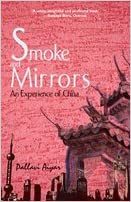Author: Pallavi Aiyar
ISBN-13: 978-8172238469
ISBN-10: 8172238460
APA Style Citation
Aiyar, P. (2008). Smoke and mirrors: An experience of China. India: HarperCollins Publishers.
Buy This Book
https://www.amazon.com/Smoke-Mirrors-Experience-Pallavi-Aiyar/dp/8172238460
| smoke_mirrors_activity.pdf |
How much do you know about two of the most populated countries in the world? Have you ever wondered what it would be like to live in another country? Pallavi Aiyar, author of Smoke and Mirrors: An Experience of China, provided her personal account of being Indian and living in China from 2002-2007. During her stay in China, she taught English at a public university and reported for an Indian newspaper. For five years, she traveled and asked questions to learn more about the history and culture of China. Her story is one that quickly draws in the reader and explores various stereotypes about two of the most populated countries in the world.
Aiyar’s story is much more than a travel journal, she shared her observations about politics and culture for both China and India. While comparing the two countries she addressed topics such as language, education, social etiquette, diet, SARS coronavirus, economic partnerships and growth, poverty, infrastructure, technological feats, gender, the elderly, religion, Tibet, and population growth to name a few. She looked at China under the leadership of Mao and the country’s preparation of the 2008 Olympics held in Beijing.
While living in Beijing, Aiyar was drawn to the hutong neighborhoods, many of which were being destroyed in preparation for the Olympics. Hutongs are narrow streets hidden between Siheyuans, a traditional building in China with central courtyards and filled with Chinese history and culture. The houses are connected, and people quickly build relationships with one another simply due to the close proximity in which they live. She talked of how the hutongs were a “celebration of the collective over the individual.” Residents also shared a communal toilet, where quite a few impromptu gatherings occurred. The densely packed housing forced people outside to come together in the cold, share gossip, play games, and exercise. Even in the winter, individuals would wake up early and participate in group exercises or dances.
After her experience in China, Pallavi is often asked the questions of “Which country is better?” and “If I could choose, would I rather be born Indian or Chinese?” Not an easy question to answer, it becomes even more complicated by the fact the countries mirror each other’s failures and achievements. To understand a little more about the politics and culture of two of the most populated countries in the world, check out Smoke and Mirrors: An Experience of China.
Other Related Resources
Book website
https://pallaviaiyar.com/books/smoke-and-mirrors/
NYT Book Review: Smoke and Mirrors
https://www.nytimes.com/2008/07/16/arts/16iht-bookwed.html
Beijing Hutong
https://www.travelchinaguide.com/cityguides/beijing/hutong/
https://www.chinahighlights.com/beijing/hutong/
https://theculturetrip.com/asia/china/articles/a-comprehensive-guide-to-beijings-hutongs/
Morning Exercises
https://qz.com/996047/the-song-and-exercise-morning-routines-of-modern-chinese-offices-have-revolutionary-roots/
Hotel Team Building Exercise
https://observers.france24.com/en/20130118-video-chinese-company-team-building-exercise-youku
Mandatory Exercise
https://foreignpolicy.com/2010/08/11/beijing-reintroduces-mandatory-exercises/
Psychological Concepts and Figures
Categorize
Collectivism
Homonyms
Identity
Optimism
Phonemes
Stereotypes
Suicide
Well-being

 RSS Feed
RSS Feed